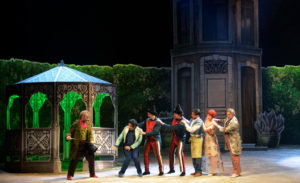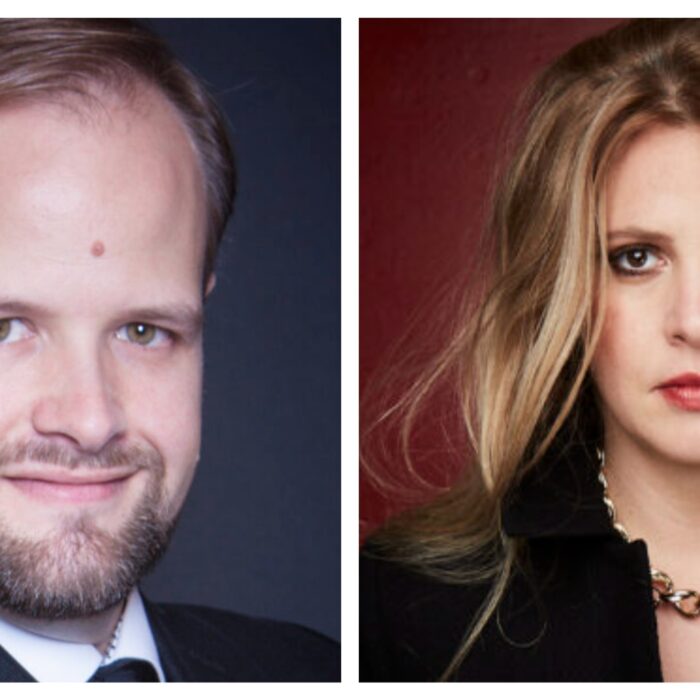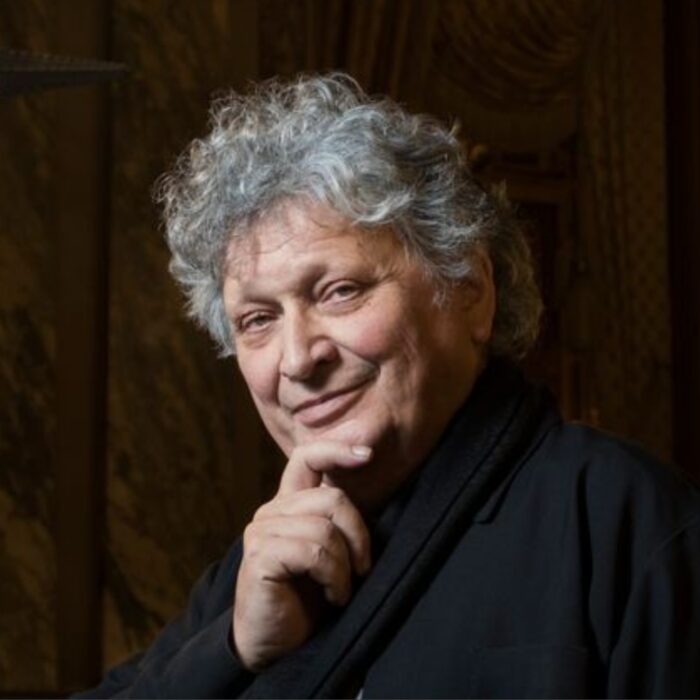
Teatro La Fenice 2017-18 Review – Signor Bruschino: Rossini Farce Gets Solid, If Not Overly Exciting, Revival
By Alan NeilsonOver the course of three years, between 1810 and 1813, Rossini rushed off five farces and a two-act opera for the Teatro Moise in Venice, which, unfortunately, closed its doors in 1818, and was subsequently demolished, although not before serving time as a puppet theatre and then as the city’s first cinema. The theater may be gone and largely forgotten, but Rossini’s farces are still going strong and receiving regular performances, less than a couple of minutes walk away, at the Teatro La Fenice. “Signor Bruschino,” the last of Rossini’s farces is now being reprised at La Fenice, along with “Il Barbieri di Siviglia” and “Semiramide” as part of “Project Rossini,” to mark the 150th anniversary of the composer’s death.
“Amateur Theater”
For this production of “Signor Bruschino,” the director, Bepi Morassi, created a reading which was based upon an amateur dramatic society’s undertaking of a production of “Signor Bruschino.” During the overture, the players are assigned their roles and can be seen preparing for the production. The whole opera was therefore presented as something you might find at a local community center or a church hall. Not a particularly ingenious idea, but it convinced in parts. He was aided by Erika Muraro (Scenography) and Nathan Marin (costumes) from the Accademia di Belli Arti di Venezia.
The first scene, thankfully a short one, was visually a fairly miserable affair; a dull curtain hung across the stage, with a couple of items of furniture scattered in front, in fact, typical of an amateur staging. The second scene, however, while still giving the impression of amateur dramatics, and fortunately of a much longer duration, was far more appealing and far more inventive. Cleverly designed to give the appearance of flat scenery, it was, in fact more; it allowed for various fast moving, comedic shenanigans to take place, and mocked its own underlying design by giving everything the appearance of being a poor facsimile, even when it obviously was not the case, such as with a garden bench or a gazebo. The costumes were a colorful pastiche of the period, and largely succeeded in delighting the eye and adding to the comedic atmosphere.
As is the norm with Rossini’s farces, “Il Signor Bruschino” is amusing rather than funny, playful rather than belly-achingly hysterical, and from this perspective, Morassi’s interpretation was successful; it always entertained and produced contented chuckling, if not exactly laughter. He used a number of devices to keep the audience engaged, allowing the drama to spill off the stage into the center aisle or the side boxes. The highlight of the evening was probably the central scene in which Sofia is pulled onto the stage on a large horse, dressed as Pallas Athena, to berate Signor Bruschino. It was all so innocent and whimsical.
All in Order
The musical direction was under the guidance of Alvise Casellati, who elicited a solid workmanlike performance from the Orchestra del Teatro La Fenice. Although he maintained a good momentum, the orchestra ultimately lacked the vivacious sparkle that really brings Rossini’s farces to life, his approach being too studied. The singers were, however, always provided with the necessary support and space, which allowed for some good singing performances.
The soprano Giulia Bolcato playing the role of Sofia, sang conservatively and well within herself in the first scene, but grew into the role and overall produced a good performance, which included some fine acting. Her voice has a crystalline timbre, a high level of flexibility, an upper register that on occasions sparkled, and an attractive coloratura, although she never really allowed it to take flight. Her showcase aria “Ah! Donate il carp sposo” was well sung and displayed her solid technique. Yet, she never really appeared to give herself fully to the role, there was always the impression that she was holding something back. It would have been interesting had she allowed herself to take a few more risks! Having her dressed, however, in an unimaginably drab costume for most of the performance, which was at odds with the colorful attire of the rest of the cast, did her no favors whatsoever and tended to diminish her profile.
One of the stalwarts of La Fenice, the baritone Omar Montanari, was cast in the role of Sofia’s guardian, Gaudenzio, and as usual, produced an impressive performance. Montanari has a real talent for light comedy, able to ham it up and feign various self-indulgent postures without ever overplaying the part. His ability to subtly exaggerate the meaning of the text through dynamic and tonal inflections heightened the comedic impact of the character. His recitatives were delivered with flair and brio, and added to the nuanced portrayal of this bumptious self-important, if ultimately sympathetic character.
Flexibility Embodied
In the title role was the baritone Filippo Fontana. He stumbled and doddered around the stage in a state of semi-confusion, as he was pressurized from all angles into doubting the identity of his own son. It was an impressive acting display, but not one that overshadowed his equally impressive singing. Fontana has a voice with a wonderful degree of flexibility, which he employed using a wide range of dynamics and tonal shadings, to create a compelling reading of old Bruschino.
The tenor, Francisco Brito, was parted as Florville, and produced an energetic performance, although he did have a tendency to allow himself to become overly animated which occasionally detracted from the overall effect. He possesses a light, sweet sounding tenor perfectly suited for Rossini, and although occasionally sounding a little uncomfortable in the upper register, made a good impression.
The innkeeper, Filiberto, was played by the bass, Andrea Patucelli, who put in a strong acting and singing performance. Although only a relatively minor role, he showed real skill, especially in the delivery of his recitatives. The soprano, Giovanna Donadini, who really appeared to be enjoying herself in the role of the maid, Marianna, sang with assuredness and bags of vitality. Double parted in the minor roles of Bruschino’s son and a police officer was the tenor Christian Collia, whose voice possesses a delightful timbre, and with which he delighted the audience.
Ultimately, this is never a work centered on individual performers, replete as it is with numerous duets and ensembles along with Rossini’s typical trademark quick-fire exchanges, but is foremost a collaboration, and the assembled cast performed marvellously as a group, interacting with a great degree of spontaneity, and with voices that blended with each other delightfully. The duet for Guadenzio and Sofia, “E’ un bel mood che due cori…,” performed with Sofia standing in a box to the left of the stage and with Guadenzio initially standing in the centre aisle, but who must then race to the back of the theater, out of the auditorium and arrive back on the stage in time to continue as Sofia finishes singing her part was not only well performed – the voices complementing each other beautifully – but also served as perfect example for the nature of the production itself: simple, light-hearted fun.


